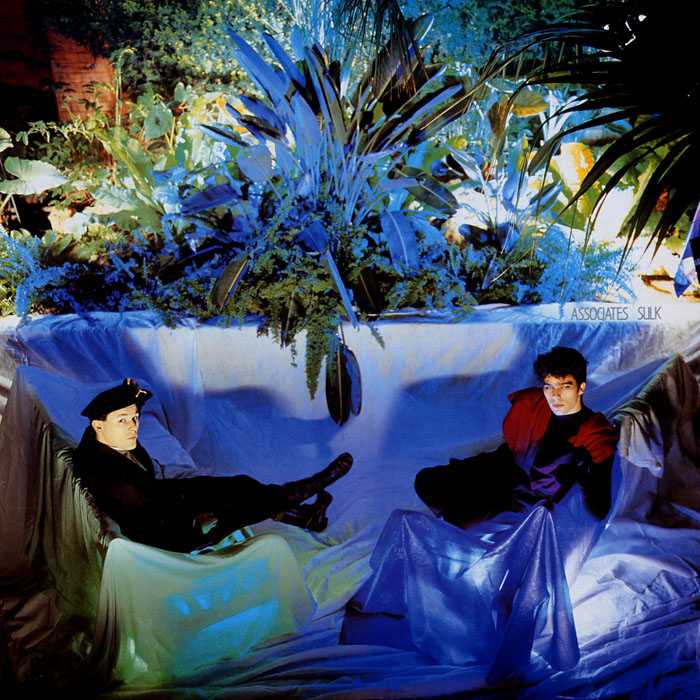For this lover of all things gnarled, rock, metal and punk, synth-pop presented a series of challenges and, once these had been hurdled, an even greater number of epiphanies. None of them were as colossal or significant than the moment I fell into the mad world of Sulk and found my appreciation of pop music in its entirety turned upside down. But that’s the effect Sulk will have on sensitive souls.
I actually owe Mojo Magazine a debt of gratitude for introducing me to synth-based music (beyond Kraftwerk, Bowie, Eno and prog) via a special edition on the genre released a few years back, although the love affair had started tentatively before then, via the enigmatic and archly beautiful sounds on Japan’s Tin Drum, a masterpiece of unusual time signatures, oblique lyrics and elegant polyrhythms that, combined with the band’s strong debt to Chinese music and culture, proved that synth-pop could be about more than bouffant quiffs and pop hits (that Tin Drum and single ‘Ghosts’ breached the UK top ten charts is as much a mystery as the album itself). Bolstered by this serendipitous find I slowly allowed myself to put aside my reservations about the occasional “tweeness” of many synth-pop bands, and delve into the strange universe of this oft-maligned sub-genre. Soft Cell, The Human League, Ultravox! (John Foxx era, natch), OMD, Depeche Mode, Visage, Yazoo: pretty soon all of these and more were lighting up my iPod and causing my synth-loathing then-partner to go spare as I danced around the living room, mouthing the words to ‘Fade To Grey’ or ‘Joan of Arc’.
But much as I loved Dare, Travelogue, Violator, Architecture And Morality and Ha! Ha! Ha!, none of the albums I discovered hit me with quite the same potency as the moment I first played Sulk, by Scottish duo Associates. Totally unaware of what lurked underneath its garish cover depicting Alan Rankine and Billy MacKenzie reclining on chaise longues under a lurid tropical canopy lifted straight out of Ballard’s The Unlimited Dream Company, I was unprepared for the explosion of ultra-bright synths that burst out of the speakers over high-speed drum patterns and throbbing bass. This was ‘Arrogance Gave Him Up’ and it would actually prove to be the most “ordinary” of the ten tracks on display, mainly because it’s an instrumental, and therefore bereft of The Associates’ greatest tool: Billy MacKenzie’s unbelievable voice. Like Soft Cell’s Marc Almond or Boy George, MacKenzie was an androgynous, sexually ambiguous character, but more than that, he was blessed with an astonishing set of pipes, being able to stretch from a low moan to screeching falsetto in a matter of seconds. As much as the arrangements are wildly brilliant and the tunes fantastic, it is Billy MacKenzie’s singing that makes Sulk.
‘No’ serves as the true gateway into Sulk’s strange netherworld after the gloss of ‘Arrogance Gave Him Up’, and it’s a thorny, frightening nightmare set to grim piano chords and a bass throb that sounds like a faltering heartbeat. “Tore my hair out from the roots/ planted it in someone’s garden/ Then I waited for the shoots” wails MacKenzie, evoking sheer insanity in just three lines before weaving a deranged narrative around the theme of self-harming. “No, no no! […] Tear a strip from your dress/ Wrap my arms in it!” he begs, the kind of lyrical and vocal soul-bearing guaranteed to raise hairs on the back on your neck (and am I the only one to hear a vague reference to Yoko Ono in there?) Even MacKenzie’s “other half” in Associates, multi-instrumentalist Alan Rankine, has admitted to being baffled by some of his pal’s lyrics but, no matter how oblique MacKenzie gets, his words always succeed in painting evocative, and often unsettling, tableaux. Indeed, the first half of Sulk is one of the most shadowy and deliberately dark in modern pop history, even as it pretends to be a full-on pop extravaganza, traversed as it is by gloomy synth melodies, bleak lyrics and edgy, jittery rhythm patterns.
From ‘Bap De La Bap’’s bonkers industrial pop clatter and overdriven synths, to the sheer, unbridled hysteria that courses through the fast-paced ‘Nude Spoons’, via a slinky, deceptively upbeat take on ‘Gloomy Sunday’, side A of Sulk represents a suite of songs as brilliantly cohesive as any in rock or pop history. ‘Nude Spoons’ stands out in particular, with MacKenzie hitting unbelievable high notes and delivering a set of lyrics so cryptic it’s hard to know whether to laugh or recoil: “I wrote a note and dug it underground […] It lies there canistered with nude spoons euphoria.” You don’t really have time to ponder the meaning of it all, because Rankine’s blitzkrieg beats and hyper-charged synth riffs, allied to the funky bass lines of ex-Cure sideman Michael Dempsey, swallow you whole, leaving you swirling in a weird technicolour vortex accompanied only by MacKenzie’s untethered ululations. As for ‘Gloomy Sunday’, few singers since Billie Holiday have captured the song’s pathos in as confident a manner as MacKenzie.
Side B is, in the circumstances, a pleasingly becalmed and upbeat affair, although it still canters along at a similarly giddy pace. It also seems to reflect more clearly the legendarily hyperactive conditions surrounding Sulk’s creation. Unlike most bands’ much-repeated legends, the stories of excess and lunacy that quickly attached themselves to The Associates are – if one is to believe Rankine and Dempsey – completely true: they did indeed blow half of Sulk’s advance on luxury hotel suites (including one for MacKenzie’s whippets), top-of-the-range smoked salmon (again, for the dogs) and enough cocaine to give Iggy Pop and David Bowie a run for their money, before throwing the rest into making Sulk as opulent and extravagant as possible. Lead single ‘Party Fears Two’ certainly fits that bill, an oddball elegy to excess, albeit one tinged by a sense that all this coke and booze is so much hot air and empty pleasure. Behind MacKenzie’s cheerful, Ferry-esque croon, Rankine’s orchestrations are positively lush, a smorgasbord of glittering synths, treated horns and slinky guitar lines. ‘Club Country’, meanwhile, is straight-ahead synth-pop bliss, a track fittingly tailored for the dancefloor even as it skewers middle class inertia: “Refrigeration keeps you young I’m told." Again, Billy MacKenzie reaches impossible heights with his delirious voice, whilst the infectious beats and glossy keyboards would make even the most reticent club-goer get up and shake his or her arse. ‘Club Country’ is easily equal to ‘Fade To Grey’, ‘Poison Arrow’ and ‘Antmusic’ as a slice of pure, catchy synth-pop, and deserved bigger success than it got. Equally, The Associates surely tapped into the genre’s promise of futurism better than most of their peers, with MacKenzie’s lyrics equal parts behoven to Ballard, Orwell and Gibson, all wrapped up in his own glitter-bomb aesthetic.
In 1982, and on the back of Sulk, The Associates looked poised to throw off their “also-ran” status and hit the big time, with Seymour Stein ready to make them huge stars in the US. Instead, all the aforementioned excess – which had probably obscured their image a bit at home – took its toll and Rankine split before a massive tour. MacKenzie soldiered on manfully for a few years, but the memory of Sulk -and the band’s now-mythical appearances on Top of the Pops that accompanied the album – quickly faded into insignificance, reduced to being relics of a “silly” era remorselessly buried by the eighties’ increasingly corporate, slick approach to pop creation. In a world dominated by Madonna and Duran Duran, there was little room for someone as esoteric as Billy MacKenzie, or for The Associates, and he and the band’s legacy would drift into relative obscurity until his suicide in 1997. It’s only now in the current culture of voracious nostalgia, that Associates are finding a new audience, and even getting name-checked by the likes of Bjork.
But such talk is so much hot air. You can wax lyrical about the whippets, the chocolate guitar, the cocaine and the tragedy all you want, the fact is that these are nothing more than snippets of what Associates’ story is all about. The truth, as obscure and outlandish as it is, rests in the psycho-pop grooves of Sulk, so much so that, as oddly “eighties” as it undoubtedly is, it also stands as one of the greatest albums of that or any decade. Bliss torn from madness indeed.




